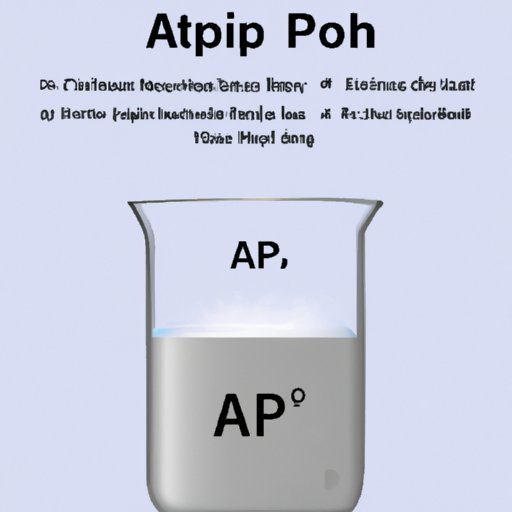Introduction
Aluminum phosphate is a compound composed of aluminum, phosphorus and oxygen. It is found naturally in soil and rocks, and can also be produced synthetically for use in various industrial applications. The solubility of aluminum phosphate in water is an important factor to consider when using it in industrial processes, as it affects the rate and extent of dissolution. This article will explore the solubility of aluminum phosphate in water and examine the factors that determine its solubility.

Examining the Interaction of Aluminum Phosphate and Water
The solubility of aluminum phosphate in water depends on several factors, including the concentration of the solution, temperature, pressure, and the presence of other ions in the solution. In order to understand how these factors influence the solubility of aluminum phosphate, it is important to understand the chemistry behind the interaction between aluminum phosphate and water.
Aluminum phosphate is an ionic compound, meaning that it consists of positively charged ions (cations) and negatively charged ions (anions). In the case of aluminum phosphate, the cation is aluminum and the anion is phosphate. When aluminum phosphate is dissolved in water, the ions separate and interact with the water molecules. The aluminum cations form hydrogen bonds with the oxygen atoms of the water molecules, while the phosphate anions form hydrogen bonds with the hydrogen atoms of the water molecules. This creates a lattice structure in which the aluminum phosphate ions are surrounded by water molecules.

Investigating the Effects of pH on Aluminum Phosphate Solubility
The pH of a solution is another important factor that affects the solubility of aluminum phosphate in water. The pH is a measure of the acidity or alkalinity of the solution, and it determines the relative concentrations of hydrogen and hydroxide ions in the solution. At higher pH levels, the concentration of hydroxide ions increases, which can cause the aluminum phosphate ions to become less soluble in the solution. Conversely, at lower pH levels, the concentration of hydrogen ions increases, which can cause the aluminum phosphate ions to become more soluble in the solution.
In addition to affecting the solubility of aluminum phosphate, the pH of a solution can also have beneficial effects when using aluminum phosphate in water solutions. For example, aluminum phosphate is often used as a flocculant in water treatment processes, and the addition of a basic substance to the solution can help to increase the efficiency of the process by increasing the amount of aluminum phosphate that is able to dissolve in the solution.

Exploring the Factors That Affect the Solubility of Aluminum Phosphate
In addition to pH, there are several other factors that can affect the solubility of aluminum phosphate in water. Temperature is one such factor, as increasing the temperature of a solution can cause the solubility of aluminum phosphate to increase. Similarly, increasing the pressure of a solution can also cause the solubility of aluminum phosphate to increase. Finally, the presence of other ions in the solution can also affect the solubility of aluminum phosphate, as the presence of certain ions can cause the aluminum phosphate ions to become more or less soluble in the solution.
A Comparison of Aluminum Phosphate Solubility in Different Types of Water
It is also interesting to compare the solubility of aluminum phosphate in different types of water. Tap water typically has a slightly acidic pH, which can cause the solubility of aluminum phosphate to decrease. Distilled water, on the other hand, has a neutral pH, which can cause the solubility of aluminum phosphate to remain unchanged. Finally, sea water has a higher pH, which can cause the solubility of aluminum phosphate to increase.
Conclusion
In conclusion, aluminum phosphate is a compound that is highly soluble in water, but the solubility of the compound can be affected by several factors, including pH, temperature, pressure, and the presence of other ions in the solution. It is also interesting to note that the solubility of aluminum phosphate in different types of water can vary significantly, depending on the pH of the solution. Overall, understanding the factors that affect the solubility of aluminum phosphate in water is important for its successful use in industrial processes.

